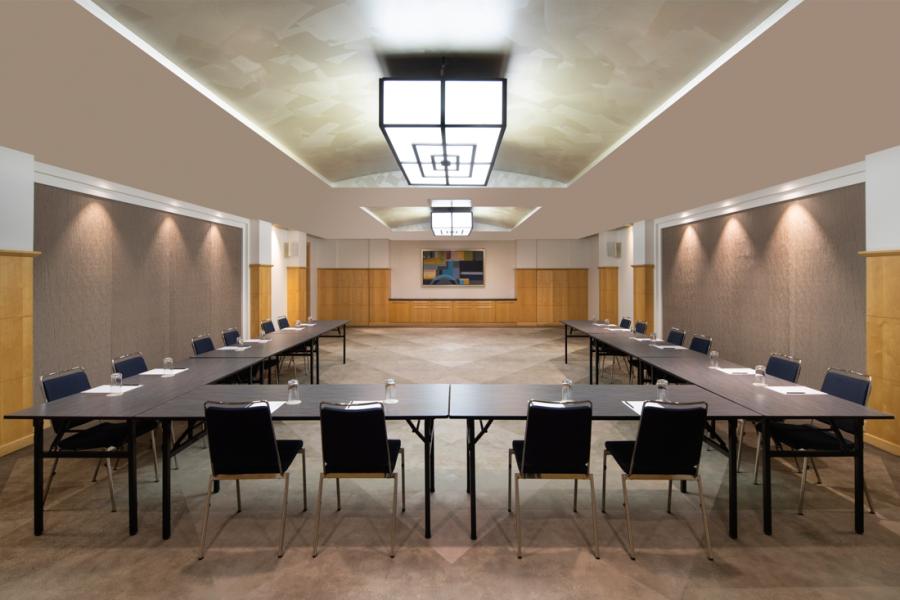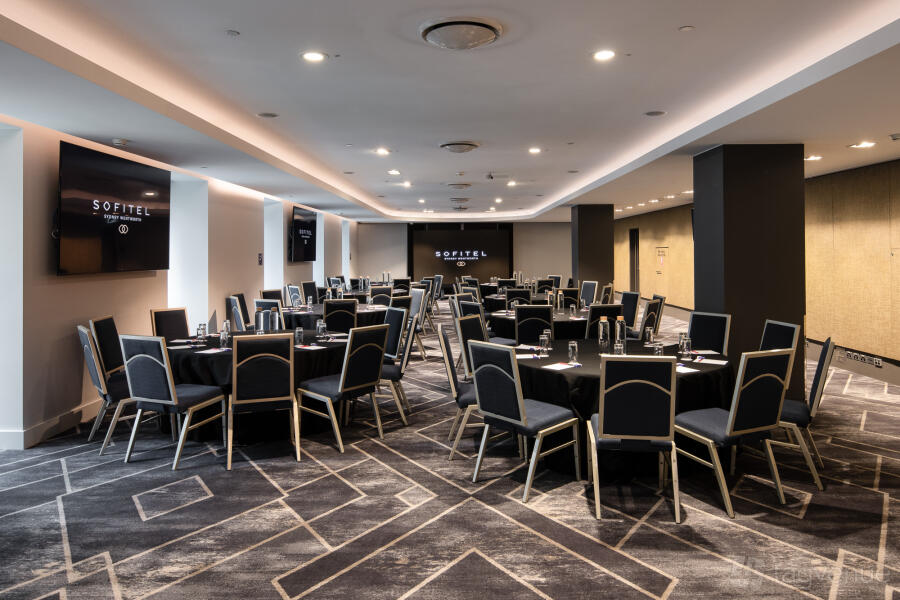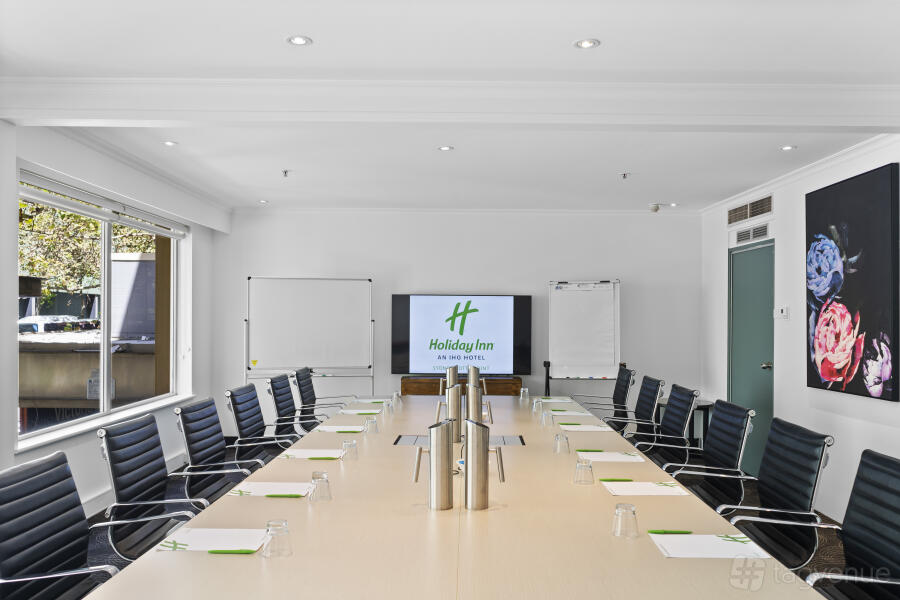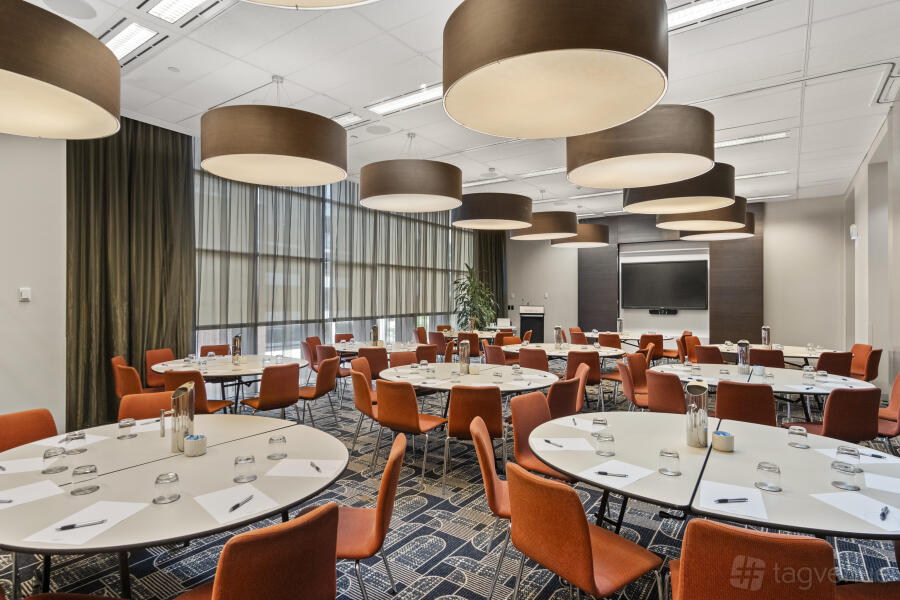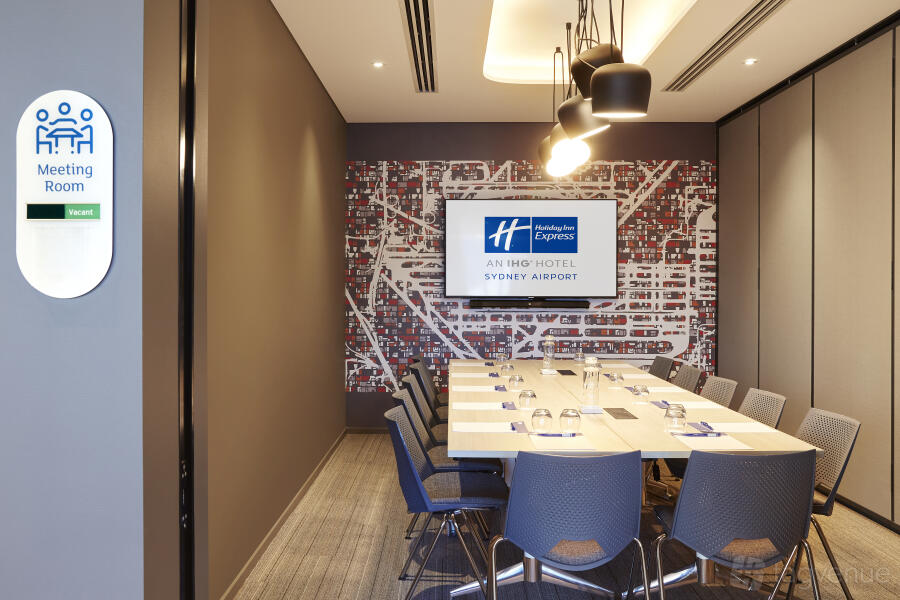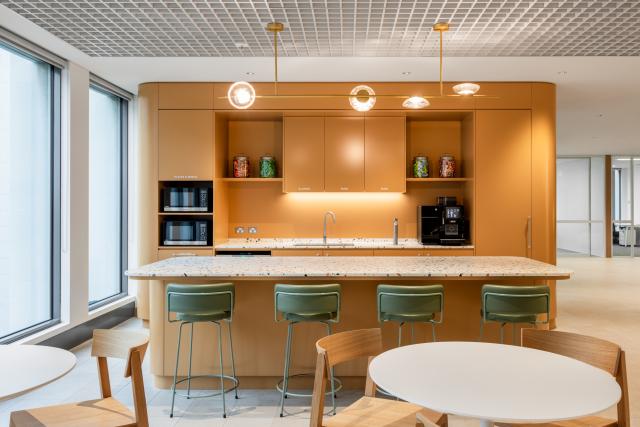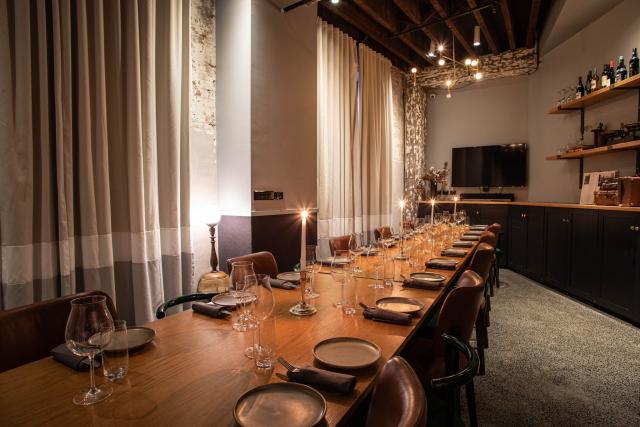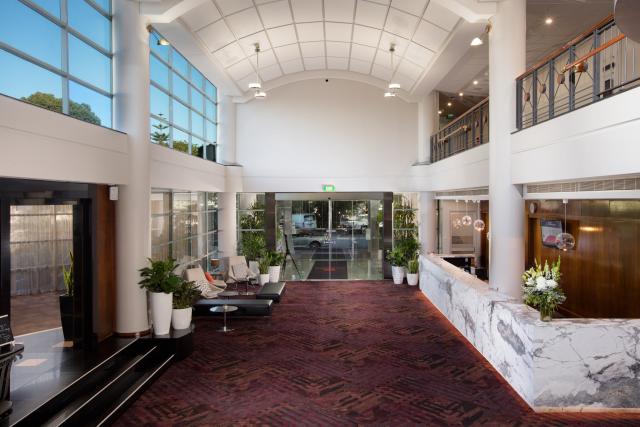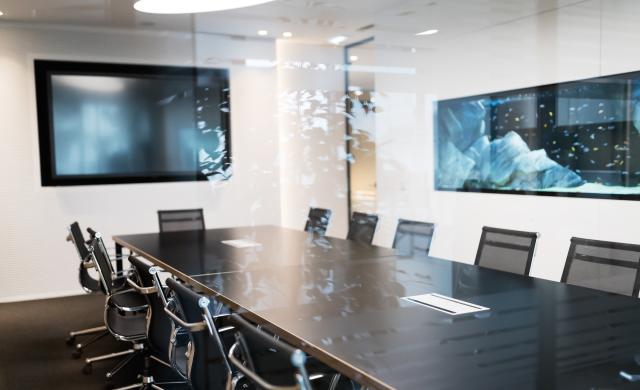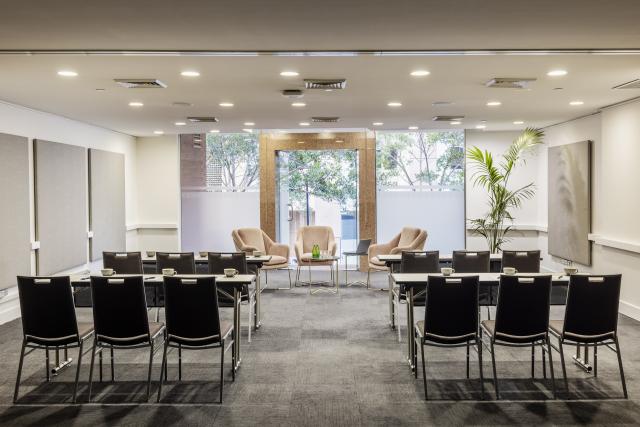Top Hotel Meeting Rooms in Sydney
Ready to host your next big meeting in Sydney? The city is brimming with hotel meeting rooms tailored to your needs. Whether it's the scenic views of Darling Harbour, the modern facilities of North Sydney, or the convenience of Parramatta, there's a venue to suit every style. With such various options, finding the perfect hotel meeting room for your event has never been easier. Explore Tagvenue, scroll our curated listings, and book your favourite today! Get ready to impress and inspire in Sydney's dynamic business landscape!
-
Oxford I
140 guestsRydges Sydney CentralSurry Hills, Sydney#Supervenue
JJames B.
“Good room for our meeting.”from $3500
minimum spend / per session -
Bella Vista Room
60 guestsPunthill NorwestHills District, SydneyLLisa
“On-site parking and easy access to the meeting room too. We were all very impressed with the venue.”from $550
hire fee / per day -
Maple Room
100 guestsSwissotel SydneySydney CBDOur Maple Room at Swissotel Sydney is a spacious and well equipped space ideal for conferences, meetings, presentations, corporate events and other buisness activities.from $3000
minimum spend / per day -
Crown Room
175 guestsRydges Sydney CentralSurry Hills, Sydney#Supervenue
NNicole
“Our recent company meeting at The Cinema, Rydges Sydney, was nothing short of exceptional.”from $5000
minimum spend / per session -
Adelaide Room
140 guestsSofitel Sydney WentworthSydney CBDEquipped with advanced audio-visual facilities for the ultimate conference experience, this meeting room is ideal for theatre-style function.from $6000
minimum spend / per session -
Lavender Bay Rooms Combined
45 guestsView SydneyNorth Sydney#Supervenue
CChris
“Beautiful bright room and fabulous view. Wonderful amenities for small meeting”from $1200
hire fee / per session -
Havoc
10 guestsRydges Sydney Airport HotelMascot, SydneyCCarol H.
“The room and set up were perfect and quiet to hold our meeting.”from $400
hire fee / per morning -
Wollemi Room
22 guestsHoliday Inn Sydney Potts PointKings Cross, SydneyThe Wollemi Room at the Holiday Inn Sydney Potts Point is a beautifully designed and functional event space perfect for boardroom meetings, small seminars, workshops, and training days.from $80
per person / per day -
Kent 1 and 2
110 guestsFraser Suites SydneySydney CBDJJoanne B.
“We had a large group of very hard to please people and we all loved the venue and the service”from $92
per person / per session -
Meeting Room
12 guestsMercure Sydney Manly WarringahBrookvale, SydneyMercure Sydney Manly Warringah offers newly refreshed modern meeting and event space for small private events, intimate board meetings, or small conferences.from $443
hire fee / per day -
Meeting Room 1
12 guestsHoliday Inn Express Sydney AirportMascot, SydneyMeeting Room 1 at the Holiday Inn Express, Sydney Airport, provides a sleek and professional setting for business gatherings. The room features a modern design with ergonomic furniture, accommodating up to 12 people comfortablyfrom $300
hire fee / per session -
Meeting Room
16 guestsHoliday inn Express Sydney Macquarie ParkMacquarie Park, SydneyThis meeting room at Holiday Inn Express Sydney Macquarie Park combines functionality with bold aesthetic choices, making it an ideal space for dynamic corporate meetings and presentations.from $300
hire fee / per session
- 1
- 2
- 3
- ...
- 9
Capacity
Budget
Event Type
Area type
Venue type
Catering and drinks
Accessibility features

FAQs about Top Hotel Meeting Rooms in Sydney
If you're planning your meeting during peak seasons (such as holidays, major events, or conferences) or during a period when the hotel is likely to be busy (like weekends for weddings or corporate events), it's recommended to book the meeting room several months in advance to secure your preferred date and ensure availability. For meetings held on regular business days and during non-peak periods, booking a meeting room a few weeks in advance should typically be sufficient. In case of urgent meetings or unforeseen circumstances requiring a last-minute booking, contact the hotel directly to inquire about availability. While it's not ideal to book at the last minute, some hotels may still have meeting rooms available.
- Sydney CBD (Central Business District): Serving as the nucleus of Sydney's business activities, the CBD hosts a plethora of hotels equipped with versatile meeting spaces suitable for various group sizes and requirements.
- Darling Harbour: Renowned for its blend of business and leisure attractions, Darling Harbour is home to hotels offering diverse meeting room options, some boasting picturesque waterfront vistas.
- North Sydney: Situated just beyond the Sydney Harbour Bridge, North Sydney is a burgeoning business enclave, housing several hotels featuring contemporary meeting facilities to cater to corporate needs.
- Parramatta: Functioning as Sydney's secondary central business district, Parramatta has several hotels equipped with meeting rooms, ideal for conducting business meetings or events in Sydney's western precincts.
- Wynyard: Serving as a pivotal transportation nexus within the CBD, Wynyard hosts numerous hotels offering convenient meeting room solutions for events or corporate gatherings.
Here's are some quick tips to plan your meeting:
- Define the Objectives: Clearly outline the purpose and objectives of the meeting. Determine what needs to be accomplished, whether it's decision-making, brainstorming, training, or team building.
- Select a Suitable Venue: Choose a hotel with meeting room facilities that align with your requirements in terms of capacity, amenities, location, and budget. Consider factors such as location convenience for attendees, availability of technology (projectors, screens, audiovisual equipment), and catering options.
- Set a Date and Time: Coordinate with key stakeholders to determine the most suitable date and time for the meeting. Ensure that the timing allows for maximum attendance and minimises scheduling conflicts.
- Send Invitations: Issue formal invitations to all participants, specifying the date, time, venue, agenda, and any preparatory materials or requirements. Request RSVPs to confirm attendance and facilitate planning.
- Plan the Agenda: Develop a detailed agenda outlining the topics to be discussed, the order of presentation, and allotted time for each item. Share the agenda with participants in advance to allow for preparation and alignment of expectations.
- Arrange the Logistics: Coordinate logistical arrangements with the hotel, including room setup, seating arrangement, audiovisual requirements, and catering services. Ensure that the meeting room is conducive to the intended purpose and configured according to your preferences (e.g., theatre-style, boardroom, U-shape).
- Prepare Presentation Materials: Gather and prepare any presentation materials, handouts, slides, or visual aids needed for the meeting. Test equipment and technology in advance to avoid last-minute glitches.
Hosting your event in a hotel conference room offers numerous advantages. Firstly, many of the city's hotels are located in prime areas, ensuring convenience and reachability for all attendees. These conference spaces are equipped with state-of-the-art technology, including high-speed internet, audiovisual equipment, and modern facilities, which makes them a top choice for professional presentations and meetings. Additionally, hotels provide comprehensive support services such as catering, event planning, and accommodation, allowing you to focus on the content of your conference rather than logistical details. Moreover, many hotel conference rooms, such as The Surry Rooftop at Rydges Sydney Central, offer fantastic views that can enhance the overall experience for your attendees, making your event one to remember. With the added benefit of being in a cosmopolitan city with excellent transport links, you just can’t go wrong with hiring a hotel conference room in Sydney!


